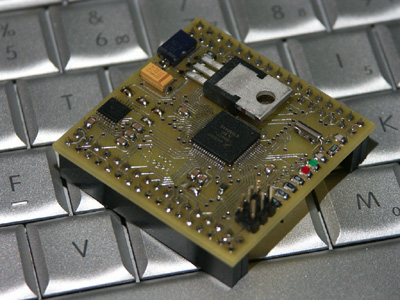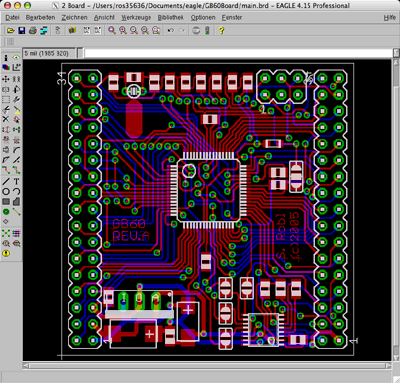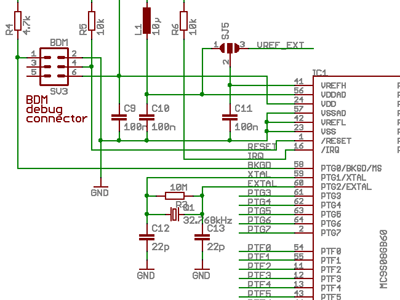The current page has been visited 38784 times.
Visitors today: 1
Hits to all pages: 9393635
Server-Time: 01:24
2025-07-10
|
GB60Board
Small and universal...

(Click picture for larger version)

(Click picture for larger version)

(Click picture for complete schematics)
|
End of 2005 I finished my design of a very small, universal microcontroller board powered by the Freescale 9S08GB60 microcontroller.
I have decided to publish this board to allow a greater audience access to this outstanding range of microcontrollers from Freescale Semiconductor.
Among other this, the controller supports BDM - the so called "Background Debug Mode" which allows programming and source level debugging through a one-wire connenction. Not long ago, this interface required a relatively expensive (some hundret US-$) special hardware. This problem was solved by the development of a open source interface which provides even private developers a cheap access to these circuits.
I was among the first developers who were allowed to betatest this open source BDM solution and I again want to thank Freescale for the outstanding good support!
In this context, I also want to mention two internet community sites: freegeeks.net and forums.freescale.com - here you can find very competent help; furthermore there are also some Freescale developers posting in these forums!
The 9S08GB60-microcontroller has an impressive list of features:
- Multiple power management modes including 20 nA powerdown @ 2 V
- Optional auto wake-up with internal timer and internal oscillator typically 700 nA @ 2 V
- 1.8 V - 3.6 V operation
- High-performance: 50nsec minimum instruction cycle time down to 2.1 V @ 20 MHz bus, 125nsec minimum instruction cycle time down to 1.8 V @ 8 MHz bus
- Single wire background debug mode
- Trace capability with 9 trigger modes and 3 breakpoints
- 60K in-application re-programmable FLASH memory
- 4K random access memory (RAM)
- 8-channel, 10-bit analog-to-digital converter (ATD)
- Two asynchronous serial communications interface modules (SCI)
- Synchronous serial peripheral interface module (SPI)
- Inter-integrated circuit bus module to operate up to 100 kbps (I²C)
- One 3-channel and one 5-channel 16-bit timer, Each channel programmable for input capture, output compare, or buffered PWM (edge or center aligned)
- Internal clock generator (zero external components)
- Programmable frequency-locked loop (FLL) and post-FLL divider generates from 32 kHz to 20 MHz bus speeds, trimmable with temperature and voltage compensation (typically < 2% drift)
- Optional external crystal, resonator, or clock
- System protection: Computer operating properly (COP)
- Low-voltage detect/reset @ nominal 1.8 V
- Low-battery warning at nominal 2.4 V or 2.1 V
- Up to 56 general purpose input/output (I/O) pins
- Programmable pull-ups
- High-current drivers (10mA sink/source @ 2.7 V, 25 mA typ.)
- Slew rate control
- 64-pin low-profile quad flat package (LQFP)
My GB60Board additionally provides to the features of the microcontroller the following things:
- Very small board dimensions: only 45 x 45 mm (!)
- Cheap 2-layer board design
- Layout allows to design stackable hardware because below the GB60Board are no components mounted!
- Integrated 32.768 kHz crystal which will be converted into high internal frequencies by the FLL of the controller
- Optionally mounted powerful (up to 1.5 A!) 3.3 V voltage regulator
- Conversion of both serial interfaces to RS232 levels; this allows a direct connection of the board to other computers!
- Internal or external Vref-source for the A/D converter module
- 2 LEDs as debug help
- 6-pin BDM debug connector
- 2 x 34-pin connectors with all important signals
The use of this project is free for private developers; if there is commercial interest, you have to contact me!
You can get the whole Eagle project incl. demo-firmware in the download area.
|
|
|





















